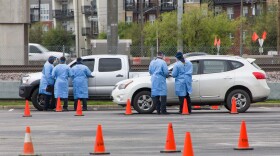
Sean McMinn
Sean McMinn is a data editor on NPR's Investigations team.
Based in Washington, D.C., McMinn reports stories in collaboration with journalists across NPR's network of member stations. He previously worked in the newsroom's News Apps/Visuals team.
McMinn came to NPR from CQ Roll Call, where he covered Congress and politics for three years as a data reporter. While there, he built interactives to help Americans better understand their government, and his reporting on flaws in FEMA's recovery programs led to the agency making changes to better serve communities struck by disaster. He also took part in an exchange with young professionals in North Africa and has spent time in Egypt and Tunisia teaching data visualization and storytelling.
Before that, McMinn taught multimedia journalism to interns through a fellowship with the Scripps Howard Foundation.
He is also an adjunct lecturer at Northwestern University's Medill School of Journalism and at American University.
McMinn is an alumnus of the National Press Foundation's Paul Miller Fellowship and has served as vice-chair at the National Press Club's Young Members Committee. He has also directed the Press Club's Press Vs. Politicians Spelling Bee fundraiser, which pits members of Congress against journalists to raise funds for the club's non-profit journalism institute.
McMinn is from Thousand Oaks, Calif. He holds a journalism degree with a statistics minor from California Polytechnic State University San Luis Obispo, where he was a reporter and editor on the student newspaper, Mustang News.
-
An NPR analysis of COVID-19 vaccination sites in major cities across the Southern U.S. reveals a racial disparity, with most sites located in whiter neighborhoods.
-
COVID-19 hospitalizations continue to strain U.S. hospitals in certain places, while the burden is easing up in other areas. Look up your local hospital to see how it's faring.
-
An NPR investigation shows that black and Latino neighborhoods in four large Texas cities have fewer coronavirus testing sites, leaving communities blind to potential COVID-19 outbreaks.
-
Trees are one of the best ways to fight deadly urban heat, but U.S. cities lose millions every year. And many low-income areas are starting at a disadvantage.
-
Low pay combined with a high cost of living make it even more of a challenge for those who suddenly find themselves without a paycheck.
-
These metro areas saw the most dramatic turnarounds in this election from red to blue — and were responsible for Democrats taking back the House.



